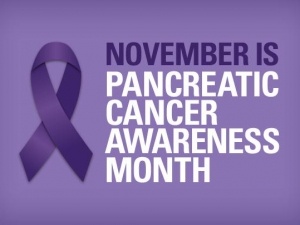
World Pancreatic Cancer Month: Raising Awareness, Risk Factors, and the Role of a Healthy Lifestyle
November is World Pancreatic Cancer Month, a time dedicated to raising awareness about one of the deadliest forms of cancer. Pancreatic cancer often goes undetected until it’s in its later stages, making it difficult to treat. This month, we focus on educating people about the importance of early detection, understanding risk factors, and how lifestyle choices such as exercise, diet, and regular screenings can help reduce the risk of developing this aggressive disease.
In this post, we’ll explore what pancreatic cancer is, its risk factors, the importance of early detection, and how lifestyle changes can support overall health and reduce the likelihood of cancer development.
What is Pancreatic Cancer?
Pancreatic cancer begins in the tissues of the pancreas, an organ located behind the stomach that plays a crucial role in digestion and blood sugar regulation. The pancreas produces enzymes that help break down food and hormones, including insulin, which regulate blood sugar levels.
Pancreatic cancer often develops silently, with few symptoms in its early stages. By the time it is detected, the cancer has usually spread to other parts of the body, making it more difficult to treat. This is one reason why pancreatic cancer has a poor prognosis compared to other types of cancer.
There are two main types of pancreatic cancer:
- Exocrine Tumors: The most common type, occurring in the cells that line the pancreatic ducts.
- Endocrine Tumors (Neuroendocrine Tumors): A rarer type that affects the hormone-producing cells of the pancreas.
Pancreatic cancer is challenging to treat, but early detection and awareness of risk factors can improve outcomes.
Risk Factors and Warning Signs
Several factors can increase the risk of developing pancreatic cancer. Understanding these risk factors can help people make informed decisions about their health:
- Age: The risk of pancreatic cancer increases with age, with most cases diagnosed in people over the age of 60.
- Family History: A family history of pancreatic cancer, or other related conditions such as chronic pancreatitis, may increase your risk.
- Genetics: Certain genetic mutations, including BRCA1 and BRCA2, increase the risk of pancreatic and other cancers.
- Lifestyle Factors: Smoking, excessive alcohol use, and a poor diet high in processed foods and low in fruits and vegetables can increase the risk.
- Chronic Conditions: Obesity, diabetes, and chronic pancreatitis are associated with a higher risk of developing pancreatic cancer.
Warning signs of pancreatic cancer can be vague and often mimic other conditions. These include:
- Unexplained weight loss
- Persistent abdominal or back pain
- Jaundice (yellowing of the skin or eyes)
- Loss of appetite
- New-onset diabetes or difficulty managing existing diabetes
If you or someone you know is experiencing these symptoms, it’s essential to consult a healthcare professional for evaluation.
The Importance of Early Detection
Pancreatic cancer is difficult to diagnose early because symptoms often don’t appear until the disease has progressed. However, early detection is key to improving survival rates. Unfortunately, there is no simple screening test for pancreatic cancer like there is for other cancers, such as breast or colon cancer. This makes it even more important to be aware of risk factors and seek medical advice if you experience persistent symptoms.
For those with a family history of pancreatic cancer or genetic predispositions, screening may be recommended. Genetic testing and consultations with specialists can also help identify those at higher risk.
Lifestyle Choices and Cancer Prevention
While there is no guaranteed way to prevent pancreatic cancer, certain lifestyle choices can reduce your overall cancer risk and support better health.
- Healthy Diet: A diet rich in fruits, vegetables, whole grains, and lean proteins provides the nutrients your body needs to stay healthy and fight disease. Antioxidant-rich foods, such as berries, leafy greens, and nuts, help protect your cells from damage that can lead to cancer. Reducing processed foods, sugars, and unhealthy fats is also crucial in maintaining a healthy weight and reducing cancer risk.
- Regular Exercise: Physical activity helps maintain a healthy weight, reduce inflammation, and improve immune function — all factors that can lower the risk of cancer. Aim for at least 150 minutes of moderate exercise, such as brisk walking, cycling, or swimming, per week.
- Avoid Tobacco and Excessive Alcohol: Smoking is one of the most significant risk factors for pancreatic cancer. Quitting smoking and limiting alcohol consumption can reduce your risk and improve overall health.
- Manage Diabetes and Chronic Conditions: People with diabetes or chronic pancreatitis are at higher risk of developing pancreatic cancer. Managing blood sugar levels through diet, exercise, and medication, as well as working with healthcare professionals to treat chronic conditions, is essential in lowering your cancer risk.
Key Statistics: Pancreatic Cancer by the Numbers
Pancreatic cancer is one of the most challenging cancers to treat due to its late-stage diagnosis. The following statistics highlight the seriousness of the disease:
- According to the American Cancer Society (ACS), pancreatic cancer accounts for about 3% of all cancers in the U.S., but it is the fourth leading cause of cancer death.
- An estimated 64,000 people in the U.S. will be diagnosed with pancreatic cancer in 2024, and about 50,000 will die from the disease.
- The 5-year survival rate for pancreatic cancer is around 12%, making it one of the lowest survival rates of any major cancer. However, this rate improves significantly if the cancer is detected early and treated before it spreads.
- Risk of pancreatic cancer increases with age, and the average age at diagnosis is 70.
These statistics underscore the importance of raising awareness about pancreatic cancer and the need for more research and early detection methods.
Final Thoughts: Raising Awareness and Supporting Research
World Pancreatic Cancer Month is an opportunity to educate ourselves and others about this aggressive disease. By understanding the risk factors, promoting early detection, and making healthier lifestyle choices, we can work together to reduce the impact of pancreatic cancer on individuals and families.
Though pancreatic cancer is difficult to detect and treat, living a healthy lifestyle — including a nutritious diet, regular exercise, and avoiding harmful habits like smoking — can lower the risk of many cancers, including pancreatic cancer. Let this month serve as a reminder to take care of our health and support ongoing research into better treatments and early detection methods.
Are you ready to take charge of your health? Join Optimized Humans today to access personalized fitness plans, nutritional guidance, and professional support to help you live a healthier life. Use the code MOVEMBERFIT for an exclusive discount on your subscription. Together, we can optimize our bodies and support healthier, longer lives.




